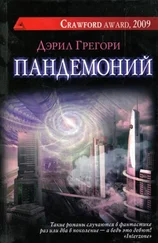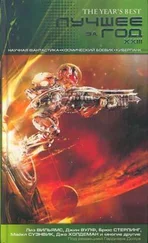“But if they’re designed, why are they so, so overwrought? ” LT asked. “Those huge fucking umbrellas out west, the sponges smothering South America, all of them crazy-colorful and smelly and weird. So my real question is—”
“Where are the space bees?” Jeff supplied.
“Wrong!” LT said. The real question was the one he was born to answer. He’d get whatever degrees and training he needed, he’d go into the field for evidence, he’d write the books to explain it. He’d explain it to Doran.
“The question is, why all this needless beauty? What’s it all for?”
“I don’t know, but you’re beautiful,” Doran said, and then—
—and then morning, a thumping that wasn’t in his head. Or not all in his head.
LT sat up, and pain spiked in his skull. Light blasted through half-open blinds. And there, beside him, Doran. Mouth agape, rough-jawed, one arm across LT’s waist.
Still there. Still real.
He wanted to fall back into the bed, pull that arm across his chest. Then the knocking came again, and he realized who was at the front door.
“Fuck.” He slipped out from under Doran’s arm without waking him, pulled on shorts. Alcohol sloshed in his bloodstream. He closed the bedroom door behind him. The pounding resumed.
LT pulled open the front door. His father started to speak, then saw what shape his son was in. Shook his head, suddenly angry. No, angri er.
“I overslept,” LT said.
“Are you packed?”
LT turned to look at the living room, and his father pushed past him.
“Dad! Dad. Could you just wait? ”
His father surveyed the moving boxes, only a few of them taped up. The rest were open, half-filled. LT’s plan had been to wake up early and finish packing. Everything had to go. Next semester he’d finish his coursework in the mountains of western New Guinea, collecting data on how birds had adapted to invasives. And now all he wanted to do was stay here, in central Illinois, in this apartment.
“Wait for what?” his father asked. “For you? ”
LT moved between his father and the bedroom. “Give me an hour. Go for lunch or something. There’s a diner—”
“I’ll start taking down what’s packed. There’s snow coming.”
“No. Please. Just… give me some time.”
His father looked at the bedroom door. Then at his son. His jaw tightened, and LT stopped himself from edging backward.
He’d lived his boyhood afraid of his father’s anger. Power, he’d learned, came not from blowing off steam, but demonstrating that you were barely containing it. You won by exacting dread, by making your loved ones wait through the silence so long that they yearned for the explosion.
“In an hour I drive away,” his father said.
1994
LT didn’t relax until they stepped off the plane in Columbus. Doran kept trying to calm him down, to no effect. The entire trip he’d been imagining that some authority would command the pilot to turn around, send them back to Indonesia. A priest would tell them, Stupid Americans, gays aren’t allowed to be parents, and they would yank the infant out of his hands.
Then he emerged from the boarding tunnel holding the baby, saw his mother, and they both burst into tears.
He eased his daughter into his mother’s arms. “Mom, this is Christina. Christina, this is—what is it, again?” Teasing her.
“Mimi!” She pressed her face close to the tiny girl and whispered, “I’m your Mimi!”
A tanned, smiling man with a tidy black goatee offered his hand. “Congratulations, LT. You’ve made your mother very, very happy.” This was Marcus, Mom’s brand-new husband, five years younger than her, at least. His mother at forty-six was still lithe and alarmingly sexy. LT hadn’t met Husband 3.0 before, didn’t know Mom was bringing him. He felt a flash of annoyance that he had to deal with this intruder at this moment—but then told himself to let it go. The day was too big for small emotions.
Doran, holding two duffel bags, one in each arm, said, “We made it.”
LT kissed him, hard. In New Guinea they hadn’t dared engage in PDA. “Eighteen years to go.”
Christina nestled like a peanut in the high-tech shell of the car seat. As Marcus drove them home, LT and Doran talked about how dicey the whole process had been. The orphanage, situated about thirty miles from Jayapura, was overcrowded, with hundreds of children left there by the crisis. The facility was nominally run by nuns, but most of the staff were local women who seemed little better off than their charges. LT and Doran had been practicing their Indonesian, especially the phrases involving gift-giving.
“We had to bribe everybody, top to bottom,” Doran said. “If it wasn’t for LT’s friend at the university yelling at them they’d have taken the shirts off our backs.”
“It’s not their fault,” LT said. “Their agriculture is wrecked. The economy’s crashing. They’re starving.”
“Maybe they should stop chewing those sugar sticks.”
“What now?” his mother asked.
He told her how the locals seemed almost addicted to an invasive plant that tasted sweet, but could not be digested. Gut bacteria couldn’t break down those strange peptides and so passed it along through the colon like a package that couldn’t be opened.
Doran said, “It would be great for my diet.”
A joke, but what Doran had seen there had scared him, and even LT, who’d spent months on the island doing fieldwork for his PhD, had been shaken by the rapid decline in the country. Thousands of alien species had been growing in the forests for two decades, ignored and unchecked, and suddenly some tipping point had been reached and those alien plants had reached the cities. The latest was a thread-thin vine that exploded into a red web on contact with flat surfaces. Villages and towns were engulfed by scarlet gauze. In the orphanage, nurses scraped it from the walls, but that only made it worse, dispersing its spores. He and Doran were terrified it was in Christina’s lungs. Invasives might be indigestible, but so was asbestos. In the morning she’d have her first doctor’s appointment. Her papers all said she was healthy, without birth defects, and up-to-date on her vaccinations, but they weren’t about to trust an orphanage under duress.
Once they reached the apartment, LT still couldn’t bear to put down his daughter. While Doran mixed formula and made beds and ordered takeout, LT fed his daughter, changed her, and then let her fall asleep on his chest.
His mother sat beside him on the couch. “You’re going to have to let Doran do more parenting.”
“He can fight me for her.”
“Big talk for the first night. Wait till sleep deprivation hits.”
Christina’s eyes were not quite closed, her lips parted. Mom had to know that he’d strong-armed Doran into adoption. His last trip to New Guinea, LT had been haunted by the abandoned children. Doran had said, This is crazy, we’re not even thirty, and LT said, My parents were teenagers when they had me, and Doran said, You’re making my case.
But that argument was over forever the moment Doran met Christina.
“You used to look just like that,” his mother said. “Milk-drunk.”
She was four weeks old, living through the days of extreme fractions. In another month, she’d have been their daughter for half her life. In a year, she would have been an orphan for only a twelfth of it. And yet those four weeks would never disappear. There would always be some shrinking percentage of her life that she’d lived alone, a blot like a tiny spore. He’d read alarming articles about adopted children who’d failed to “attach.” What if the psychic damage was already done? What if she never felt all the love they were bombarding her with?
Читать дальше












